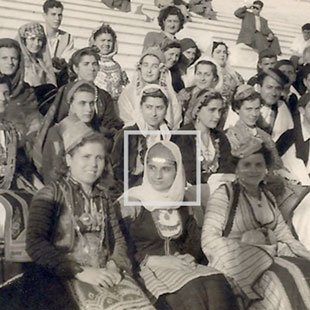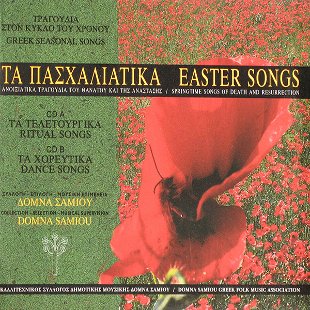You are at: Home page Her Work List of Songs Zaphiris
Ζαφείρης - Sung by girls during a country game
Listen
Lyrics
Zaphiris, you’re a tubby lad, you’re short and roly-poly,
the door locks are all rusted up and weeds have choked the doorways,
you’ve left the houses tumbled down, the ovens heaps of rubble,
what’s more you’ve left your wife with child, a child to swell her belly.
– Get up, Zaphiris. See, we’re here, Zaphiris come and catch us.
– What eyes have I to see with now, to see where I am going,
for both my eyes are withered up and look like tiny seed pearls,
my little arms have mouldered, my little legs have mouldered.
– We’re going to restore your arms, restore your legs that mouldered.
Now springtime has come round again, the earth is rich in blossom,
why you, dear friend, Zaphiris, too, must wake from heavy slumber.
Get up, Zaphiris, catch us now, get up so you can chase us.
Translated by John Leatham
Original Lyrics
Ζαφείρης
Ζαφείρη μ’ κοντοστρόγγυλε και κοντομαζωμένε,
εσκούριασαν οι κλειδωνιές, χορτάριασαν οι πόρτες,
άφ’κες τα σπίτια χάρβαρα, τους φούρνους γκρεμισμένους,
άφ’κες και τη γυναίκα σου με την κοιλιά γεμάτη.
– Για σούκ’ Ζαφείρη μ’ να μας δεις, Ζαφείρη μ’ να μας πκιάκεις.
– Με τι ματάκια για να δω, να δω να περβατήσω,
που ρέψαν τα ματάκια μου σαν το μαργαριτάρι,
που κόπ’καν τα χεράκια μου και τα ποδαράκια μου.
– Σου λύνουμε τα χέρια σου, σου λύνουμε τα πόδια.
Τώρα που ήρθ’ η Άνοιξη και γέμ’σε η γης λουλούδια,
τώρα και συ Ζαφείρη μου ξύπνα απ’ τον βαρύν ύπνο.
Για σούκ’ Ζαφείρη μ’ να μας πκιάκεις,
για σούκ’ να μας κυν’γήσεις.
Information
- Region: Epirus
- Area: Ioannina, Zagori
- Categories: Ritual Song, Spring Song
- Rhythm: 2 beats
- Duration: 02:41
Collaborators
- Singer: Androniki Martino, Zacharoula Motska
Albums
Notes
Zaphiris was a game played throughout the spring, particularly in May, by young and adolescent girls -and at one time by some of the boys- in the fields and pastures during breaks in the daily round of country life. One of the girls, or a boy, who was to play the part of Zaphiris lay down on the grass and pretended to be dead. The others tied their arms and feet with red threads. On their crossed arms they laid the icon they had taken from a nearby chapel which they were obliged to visit, there to light candles and the oil-lamps, before they began to play Zaphiris. They covered the face of the dead Zaphiris with a white kerchief and by their side they placed a stick. They made a ceremony of burying Zaphiris beneath a heap of greenery, herbs with magico-therapeutic properties and certain flowers. Having decorated the corpse the girls sat around the departed person, just as keening women do at funerals in order to lament. Sitting at the head the leading mourner sang verse by verse the words of the lament, while the others, weeping and moaning, striking their breasts and pulling their hair, repeated the ‘kommό’, that is, the dirge of Zaphiris, accompanying it with the indispensable wailing.
There are few written descriptions of this significant event. Apart from the song included in this collection the following version has been preserved by D. Sarros. It bears in purest form the poetic characteristics of a conventional lament (‘mirolόϊ’).
See the youngster I’ve laid out - I’m eaten up with grief,
see the cypress tree - woe is me,
he does not stir, he moves no limb - I wish that I were dead,
he does not vaunt his manliness - woe is me.
Who chopped your roots and laid you low - ah, my poor soul –
and withered your straight sturdy trunk? - woe is me.
What have you done to me, my boy - I’m eaten up with grief,
what have you done, my soul? - woe is me.
It is an autumn month - indeed, say I,
It is a winter month - woe is me,
may springtime come again - ah, my son,
may summer come again - woe is me,
the boughs are burgeoning with blossom - hark, my son,
the plains are strewn with flowers - woe is me,
birds that come in spring are here - ah, apple of my eyes -
and swallows too have come - woe is me,
for the great feast of Easter Day - I’m eaten up with grief,
and the ‘Christ is Risen!’ greeting - woe is me,
when young men dress in red - ah, my fine lad,
old men in purple dye - woe is me,
and you, fine handsome lad - ah, my fine lad,
lying in the earth so dark - woe is me,
how can you stir, how move your limbs? - I’m eaten up with grief.
Show off your manliness - woe is me,
open your eyes, stand up, good lad, Zaphiri.
No sooner had the last verse been sung than Zaphiris jumped up and laughter and singing took the place of lamentation. The resurrected corpse, menacingly shaking the stick, chased after the other girls; it was the lot of the one who was caught to play the role of Zaphiris the following year. It is related that in earlier times a doll, a swaddled length of wood, served as the youngster Zaphiris. It was buried in the usual manner and a dirge sung over it. When the supposed resurrection occurred they exhumed it and took it to a chapel where it was kept till the next performance of the custom. When spring was past they undressed the doll and threw the length of wood into a stream. Miranda Terzopoulou (1998)
Translated by John Leatham
Recording information
Studio recording, 1997.
Based on a recording of the Centre for Greek Folklore Research made by D. Ekonomidis in Central Zagori in 1966.
Member Comments
Post a comment
See also


Song
It Is May Month

Song
Maria’ S Gone to Pick Some Lilac
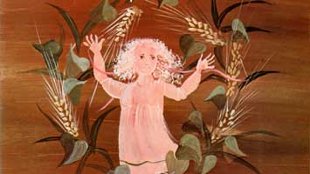
Song
May

Song
May Is Come

Singing Spring

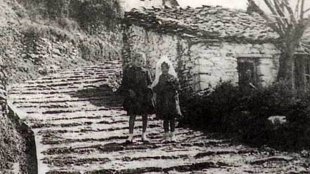
Song
Sweet Basil of the Holy Cross

Song
Glory Be to Every Day
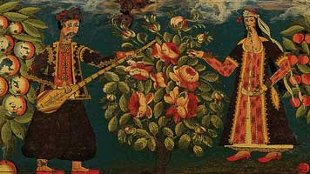

Song
So Many Lies

Song
Song of Saint George



